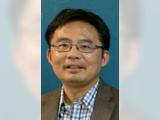GESTAR II Seminar Series, Tuesday, July 26 at 2:00pm
Speaker: Dr. Jun Wang
Join us for a virtual seminar by Dr. Jun Wang, James E. Ashton Professor, College of Engineering; Interim Chair, Department of Chemical and Biochemical Engineering; and, Assistant Director, Iowa Technology Institute, University of Iowa. His talk is titled "NightHawk: A satellite mission concept for low light imaging of fires, aerosols, and beyond."
Date and Time: Tuesday, July 26, 2022 at 2:00pm
Join us via Teams.
Abstract:
In this talk, Dr. Wang will provide a brief overview of fire detection from space and articulate the need of a satellite mission for low light imaging to renew the legacy of first fire detection from space made by using visible light in the early 1970s. NightHawk is a satellite mission concept that is currently in formulation. If successful, it will shed light on fire characteristics, smoke transport, urban air quality, and light pollution, all at night. It will measure nighttime light from fires, cities, and the moon at multiple wavelengths. Its data can be used to derive fire combustion efficiency and fire phase, locate fire lines, and retrieve aerosol optical depth and properties. They also can be used for disaster management and the study of urban development and environmental justice. Ultimately, NightHawk will serve as a pathfinder for researchers to quantitatively obtain aerosol, cloud, and surface information at night in a similar manner as they are getting at daytime from existing satellites.
Biography:
Dr. Jun Wang is a James E. Ashton Professor at the College of Engineering, Interim Chair for the Department of Chemical and Biochemical Engineering, and Assistant Director of the Iowa Technology Institute at the University of Iowa. His research focuses on the integration of satellite remote sensing and chemistry transport models to study air quality, wildfires, aerosol-cloud interaction, and land-air interaction. He has authored 170+ research articles (H-index 52), co-edited two books, served as a science team member for 10 satellite missions (including the inaugural team for TEMPO and MAIA) and the NASA's senior review panel for Earth science (twice). He conducted his Ph.D. work in atmospheric sciences at the University of Alabama-Huntsville in 2005 under the support of NASA's Earth system science graduate fellowship and his postdoctoral work at Harvard University with the support of NOAA Climate and Global Change postdoctoral fellowship in 2005-2007. He was a recipient of NASA's New Investigator Program award in 2009. More about his research team can be found at https://arroma.uiowa.edu.
For more information on the GESTAR II Seminar Series, click here.
Tags:
Posted: July 21, 2022, 9:14 AM
